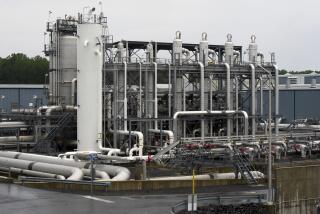Stay Cool on Turkey-Iran Deal
- Share via
“The wrong message to Iran” is how the State Department characterizes the deal signed Monday that commits Turkey to buy $20 billion worth of natural gas from the bitterly anti-American regime in Tehran. More to the point, however, is what message the long-term agreement sends to Washington.
The Clinton administration worked hard to dissuade the new Turkish government headed by Prime Minister Necmettin Erbakan from closing the gas deal. Erbakan, who took office last month after a surprise showing by his pro-Islamic Welfare Party, insists that Turkey is not trying to challenge U.S. efforts to keep Iran isolated because of its support of international terrorism. Whatever the case, there’s no doubt that Iran is welcoming the plan for a $1.5-billion, 850-mile pipeline not just as a benefit to its economy but also as a pronounced snub to the United States.
Washington now faces a delicate problem in choosing how to respond to the Turkish move. A controversial and unwise new law authorizes the president to take punitive measures against American and foreign companies that invest more than $40 million a year in the oil and gas industries of Iran and Libya, which also is involved in international terrorism. Turkey insists the new pipeline and the gas purchases that are to begin in two years are elements of a trade agreement, not an investment. From what’s known of the deal, that seems right. Right or not, those in Congress who championed the sanctions law, which President Clinton too eagerly signed, may well demand penalties against Turkey.
The administration should move with considerable caution in this matter. There may be reason for concern that Erbakan, if he had a free hand, would quickly try to shift Turkey away from the secularist and pro-Western positions it has held since the early 1920s. For now, though, his coalition government is behaving with restraint. While Erbakan clearly intends to warm up Turkish relations with other Islamic countries, he also has been careful to affirm support for Turkey’s membership in NATO and strengthening of its economic ties with the European Union. The Iran gas deal is not to American liking. But it does not signal a major shift in Turkey’s orientation. Washington should avoid overreaction.
More to Read
Sign up for Essential California
The most important California stories and recommendations in your inbox every morning.
You may occasionally receive promotional content from the Los Angeles Times.













